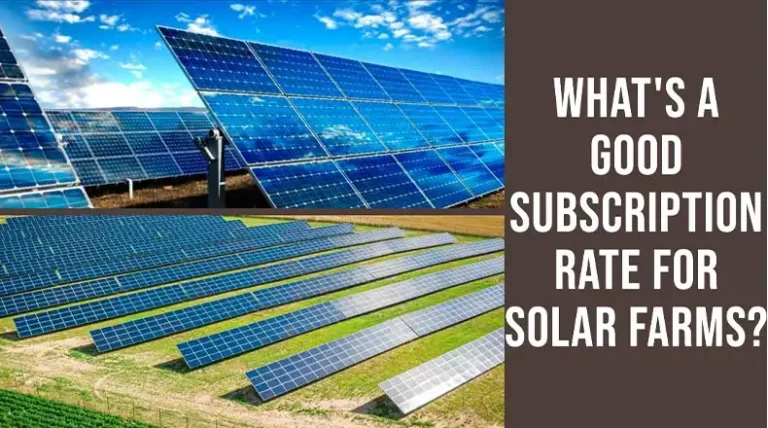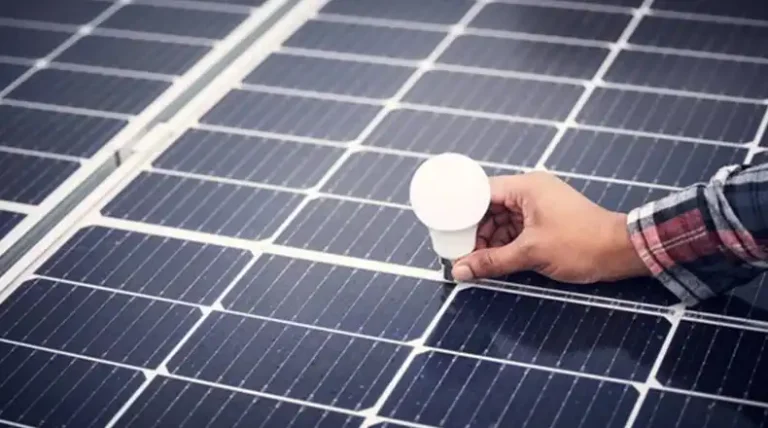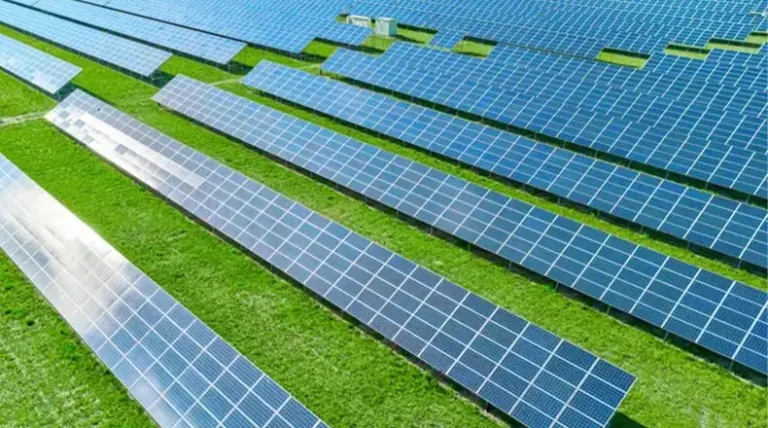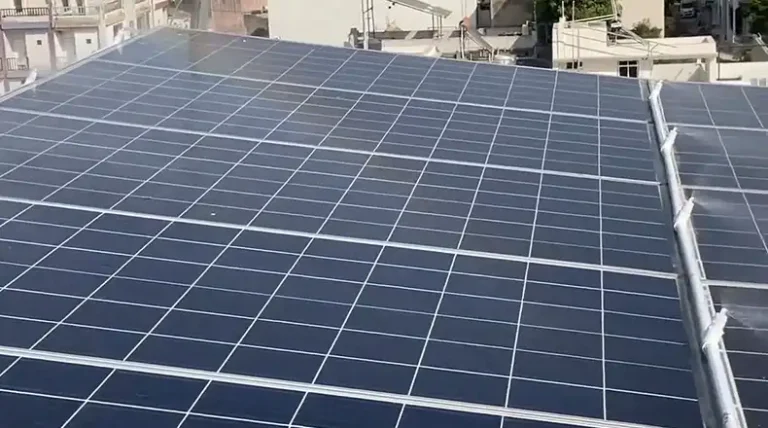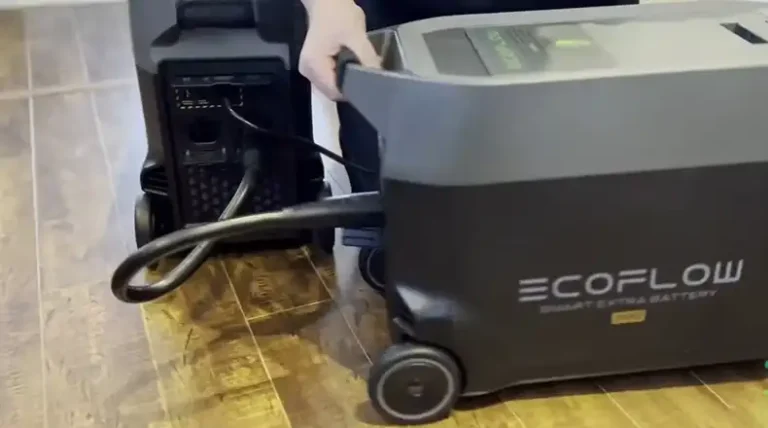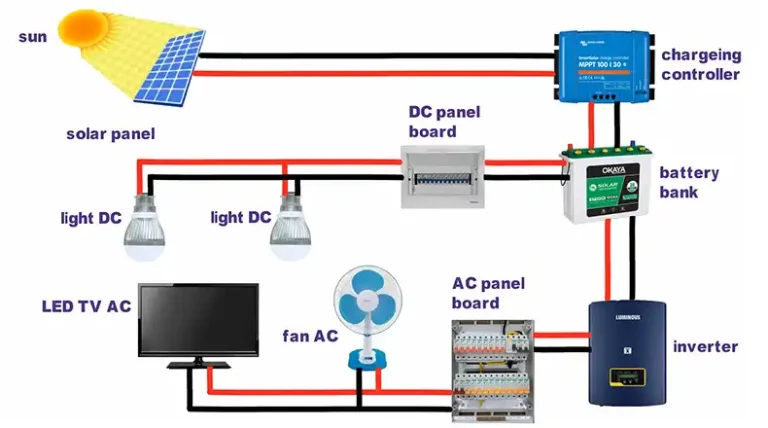How to Safely Turn Off Solar Panels for Cleaning
Regular cleaning keeps your solar panels performing at optimal efficiency. However, handling solar equipment while powered on can risk dangerous electric shock. For personal safety, it’s critical to fully shut down and deactivate the solar panels before attempting any hands-on cleaning. But how exactly do you do this safely?
Solar panels can be safely turned off by shutting down the inverter and disconnecting the DC cables from the roof array. Only after confirming deactivation by checking voltage should you proceed with wiping panels.
Don’t worry, we’ll take you through the essential steps and safety measures in this guide to ensure a safe and effective solar panel cleaning experience. Follow these key steps to properly shut down solar panels for cleaning.
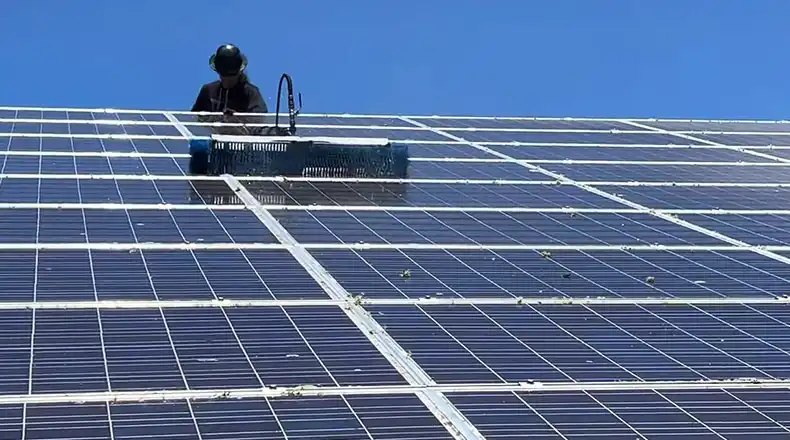
Turning Off Solar Panels for Cleaning
Properly shutting down a rooftop solar array involves these basic steps:
Step 1: Locate the Inverter Switch
The inverter converts DC from the panels to usable AC. Find the on/off switch or lever on the inverter case and switch it to the off position. It’s usually near your main electrical panel.
Step 2: Find the DC Disconnect
The DC isolator switch is your portal to solar shutdown. There will be a large DC isolator or disconnect switch that attaches to cables leading to the roof solar arrays.
Step 3: Turn Off the DC Disconnect
Flip the lever or switch on the DC disconnect to fully open the contacts, de-energizing the incoming solar cables.
Step 4: Verify Solar Arrays Are Deactivated
Use a multimeter to check for voltage. You should read the 0V output when the disconnect is successfully opened.
Step 5: Cover Any Exposed Contacts
Cap off or tape over any solar wiring contacts to avoid accidental contact during cleaning.
Once these steps are complete, you can safely access panels for scrubbing without risk of shock. Reverse the process after cleaning to reactivate the system.
Powering Back Up After Washing Panels
To bring your solar installation back online after cleaning:
Step 1: Remove any lockout devices or caps from the electrical disconnects
Step 2: Reconnect the cables securely to the roof arrays if they were disconnected
Step 3: Double check all electrical connections are tight and secure
Step 4: Flip the inverter power switch back to the “on” position
Step 5: Closely observe system restart to ensure normal functioning
Take care to properly restore all wiring and power connections after cleaning routines.
Extra Safety Precautions
Apart from the electrical shutdown procedure, consider these safety precautions during solar panel cleaning:
- Protective Wear: Wear appropriate protective gear, including gloves, eyewear, and long-sleeved clothing, to prevent injuries from debris or cleaning solutions.
- Look Out for Weather Conditions: Avoid cleaning solar panels during extreme weather conditions, such as heavy rain, strong winds, or intense heat.
- Use of Abrasive Materials: Avoid using abrasive materials or harsh chemicals that could damage the delicate surface of solar panels.
- Climbing Roof with Safety Gear: If accessing roof-mounted panels, always use proper safety equipment, including a sturdy ladder and fall protection devices.
Exercising caution is key for injury-free solar panel cleaning and maintenance.
Why You Need to Disable Solar Panels Before Cleaning
With panels exposed to outdoor elements, regular washing is essential to remove:
- Dust and dirt buildup
- Pollen, leaves, bird droppings
- Snow, ice, and storm debris
- Moss, lichens, and other growth
But even small solar panels can produce amps and volts that pose a severe shock hazard. Turning off solar panels before cleaning is paramount for several reasons:
- Preventing Electrical Shock Hazards: Even in partial shade, solar panels can produce electricity, posing a risk of electrical shock if touched while cleaning. Deactivating the system eliminates this hazard.
- Protecting the Solar System: Cleaning with running water or using abrasive materials can damage the delicate components of solar panels. By turning off the system, you minimize the risk of accidental damage.
Fully deactivating the solar system eliminates these very serious risks inherent to washing active solar equipment.
What Will Happen If I Clean My Solar Panels When They’re On?
Cleaning solar panels while they are on can be dangerous and can damage the panels. Here are some of the risks involved:
Electrical shock: Solar panels generate electricity, and even when they are not producing any power, there can still be a residual current. If you touch a live wire while cleaning your panels, you could be electrocuted.
Damage to the panels: Solar panels are delicate, and if you scrub them too hard or use the wrong cleaning solution, you could scratch or damage the surface. This can reduce the efficiency of the panels and shorten their lifespan.
Fall risk: People are often thrown off when they get an electric shock because it is an unexpected and often painful sensation. The electric current can also cause muscle contractions, which can cause the person to fall or pull away from the source of the shock. Solar panels are often located on roofs, and if you are not careful, you could fall off while cleaning them.
Effect of DC/Solar Panel Electrocution on Your Body
Electrocution from direct current (DC) sources, such as solar panels, can have significant and potentially fatal effects on your body. The severity of the effects depends on several factors, including the amount of current, the duration of exposure, and the path of the current through the body.
Immediate Effects of DC Electrocution
When exposed to DC electrocution, the body reacts immediately due to the passage of electrical current through the nervous system. The primary effects include:
Muscle contractions: The current can cause involuntary muscle contractions, leading to spasms, rigidity, and loss of muscle control.
Respiratory paralysis: In severe cases, the current can interfere with the respiratory muscles, causing difficulty breathing or even complete respiratory arrest.
Cardiac arrest: The current can disrupt the heart’s electrical rhythm, potentially leading to cardiac arrest and loss of heartbeat.
Burns: DC electrocution can cause burns at the points of entry and exit of the current, ranging from superficial burns to deep tissue damage.
Long-Term Effects of DC Electrocution
In addition to the immediate effects, DC electrocution can also have long-term consequences, including:
Neurological damage: Damage to nerves and nerve pathways can lead to permanent sensory or motor impairments, such as numbness, tingling, or paralysis.
Psychological trauma: Electrocution can be a traumatic experience, causing anxiety, post-traumatic stress disorder (PTSD), and other psychological issues.
Cardiac complications: In some cases, electrocution can lead to long-term cardiac problems, such as arrhythmias or heart failure.
Frequently Asked Questions
How Do I Access Wiring On Roof-Mounted Panels?
Use solar installation maps to locate wire routing. Retain panel numbering schemes. Accessing wiring on roof-mounted panels may require additional safety precautions and may be best handled by a qualified solar technician.
Is Covering Panels Easier And Safer Than Deactivating?
While covering panels can provide shade and reduce the risk of electrical shock, it is not a substitute for proper electrical shutdown. Covered panels still generate dangerous voltage. Fully disconnecting is safest. Covering panels may also hinder effective cleaning.
How Long Does The Shutdown Process Take?
If equipment is accessible, solar arrays can be deactivated in 10-15 minutes.
What If I Don’t Have A Separate Inverter Switch?
Turning off the main breaker for your home will also deactivate the solar system. If your system lacks an inverter switch, consult your solar panel installation manual or contact the installer for specific instructions on shutting down the system.
Conclusion
While essential for optimal solar performance, cleaning active solar panels poses severe shock hazards if not deactivated properly. By methodically shutting down the inverter, disconnecting cables, verifying loss of voltage, and taking other safety steps outlined, you can avoid injury and scrub away dirt for maximum solar production. Proper protective gear further minimizes the risks of falls. Regular cleaning is safe with the right solar electrical precautions. If you have any other queries regarding this topic, feel free to ask in our comment section below. Thanks for reading!

